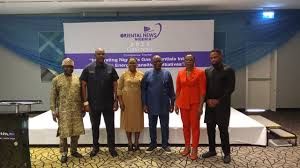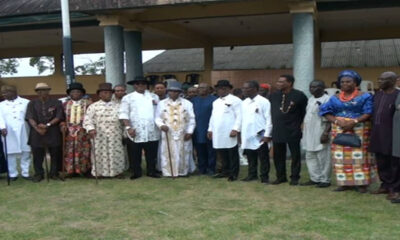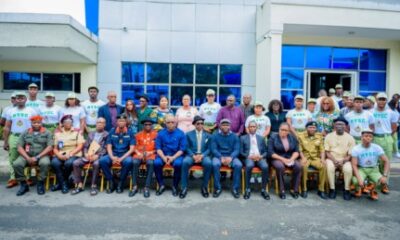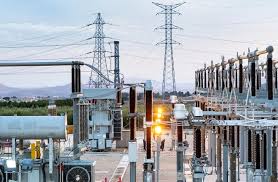Maritime
Truckers Raise Alarm Over NPA’s Call-Up System

The Nigerian Association of Road Transport Owners (NARTO) has issued an urgent call to the Nigerian Ports Authority (NPA) management and handlers of the eto electronic call-up system, urging immediate action to address what they describe as unfriendly policies hampering the direct delivery of cargo from the Lagos Port.
According to the Chairman of NARTO Metropolitan Unit, Abdullahi Moh’d Inuwa, the new policies under the eto call-up system have led to significant delays in truck approvals and discouraged truck operators from servicing the port.
“Direct delivery of cargo requires between 48 to 54 trucks daily per vessel, and with multiple vessels, at least 120 to 150 trucks are needed.
“However, the current approval process is slow, and many truckers now prefer loading outside the port due to the multiple levies and restrictions imposed”, Inuwa stated.
He warned that these developments threaten the business interests of consignees and importers, with many considering diverting cargo to other ports.
“Trucks are being forced to offload inside sheds, incurring extra charges and demurrage, which are eventually passed on to end users. Despite government efforts to reduce duties on agricultural products, the call-up process remains a major bottleneck”, he added.
The trucker said prompt intervention is crucial to restore confidence and ensure the smooth evacuation of cargo, which is vital for Nigeria’s import-dependent economy.
Truckers and port users have repeatedly complained about extortion by security agencies, racketeering in the call-up system, and policy inconsistencies that have resulted in gridlock, delays, and financial losses.
Industry sources confirm that the current system often favors certain operators, leaving others stranded and forcing importers to pay exorbitant fees to favours revalidate delivery orders.
NARTO is calling for a review of the eto call-up system to ensure fairness and efficiency, warning that continued inefficiencies could lead to further congestion, trade disruptions, and a shift of cargo traffic away from Apapa Port.
The association also appealed to security agencies to stop the harassment and extortion of truck drivers, and urged the NPA to harmonize safety requirements to avoid multiple taxation.
By: Stories by Nkpemenyie Mcdominic, Lagos
Maritime
FG Assures On Intensifying Diaspora Investment

Nigeria’s President, Bola Tinubu, has assured that his administration would ramp up efforts to create the enabling environment that would attract more investments from Nigerians in Diaspora and harness their immense talents, skills, expertise, innovation and contacts for national development.
He gave this assurance in his remarks as the special guest of honour at the opening of the 2025 National Diaspora Day (NDD) organised by the Nigerians in the Diaspora Commission (NIDCOM) with the theme, “Optimizing Formidable Diaspora Potential For National Development and Growth”, at the Banquet Hall of the Presidential Villa in Abuja, on Friday.
Represented by the Secretary to the Government of the Federation (SGF), George Akume, the President acknowledged the enormous contributions of the NIDCOM in terms of remittances, which hit $20.9 billion by 2024 with the promise of more remittances in the years ahead.
“We will continue to provide an enabling platform for effective policies for the Diaspora with the view to galvanizing your support for this administration and concretizing our democracy, optimizing your potential and setting a good example for other African countries to emulate”, he said.
The President commended the Chairman/CEO of NiDCOM, Hon. Abike Dabiri-Erewa and the management and staff of NiDCOM for their dynamic initiatives, activities and engagements with the Diaspora community, especially in the creation of laudable programmes for Nigerians in Diaspora to invest back home.
“Let me also state that we will look into the Challenges NiDCOM has enumerated with a view to ameliorating the same so that we can maximize the benefits of migration through the engagements with our Diaspora for national development and growth”, the President said.
The highpoint of the occasion was the unveiling of the “Diaspora Home and Abroad Housing Platform”, which will help facilitate easy access to affordable homes.
In her remarks, Hon. Dabiri-Erewa noted that since the establishment of the commission over six years ago, it has vigorously pursued policies and programmes that have given the nation uplift and encouraged Nigerians in the Diaspora to make more investments in the country that are yielding results in different sectors of Nigerian lives.
These programmes include the National Diaspora Day Celebration held annually on 25th and 26th of July and 2025 is the 7th edition. It is an event to celebrate over 20 million Nigerians in the Diaspora and the varied contributions they have made in diverse fields.
NIDCOM initiated the National Diaspora Merit Award to honour those individuals and associations who have contributed to the development of Nigeria and their host country.
It also has the Badagry Door of Return Festival to commemorate the Nigerian descendants from slave trade era and the significance of the ancient Badagry during the period
Other initiatives include: The Diaspora Mortgage scheme, the Diaspora Investment Fund, and the Diaspora Housing Scheme.
The Chairman, Senate Committee on Diaspora and Non-Governmental Organizations (NGOs), Aniekan Bassey, in his remarks emphasized that Nigeria is a veritable home for investment, stressing that it has become necessary for job creation and skill development among the youth.
In her goodwill message, Isabelle Wolfsgruber from the Head Office, International Centre for Migration Policy Development (ICMPD), Abuja, said the event is not just a celebration, but a call to action and a recognition that the Nigerian diaspora, among the most dynamic, educated, and resourceful globally, holds boundless untapped potential to contribute meaningfully to national development.
She assured that the ICMPD will partner more with NIDCOM to ensure inclusive migration governance that fully integrates diaspora contributions to national development.
###
Maritime
Nnaji Bemoans Darkness In Nigeria In Plenty Gas Reserves

Former Minister of Power, and current Chairman of Geometric Power, Barth Nnaji, has expressed regret that despite having over 200 trillion cubic feet of proven gas reserves, Nigeria continues to struggle with supplying enough fuel to its power plants.
Nnaji, who disclosed this at the just-concluded Orienta News Nigeria 2025 Conference in Lagos, expressed deep concern over what he described as “a national contradiction”, to be rich in natural gas, but still failing to meet domestic electricity generation needs.
“It’s quite perplexing. We are a gas-rich country, yet we struggle to supply enough gas to our power plants. It’s a contradiction that many find hard to understand”, he stated.
He noted that while the official domestic gas price for power generation was formerly pegged at $2.42 per million British thermal units, the Nigerian Midstream and Downstream Petroleum Regulatory Authority (NMDPRA) revised this down to $2.13/MMBtu effective April 1, 2025.
He, however, said generation companies often source gas from the open market at $2.70 and above, depending on supply constraints and contract terms.
“Because most electricity is generated using gas, and GenCos depend heavily on sourcing this gas from the open market, the disparity between the regulated and actual prices continues to strain the sector”, said.
The former Power Minister warned that the pricing gap is worsening liquidity challenges in the power sector, contributing significantly to the over N1tn electricity subsidy recorded in the first half of 2025 and the growing trillion-naira debt owed to GenCos by the Federal Government.
According to him, the gas-to-power benchmark being below market realities places an unsustainable burden on power producers.
He also emphasised the need for more cost-reflective electricity tariffs, explaining that the current pricing structure fails to cover the operational and maintenance costs of genCos, particularly as many critical inputs are imported.
According to him, “The energy charge component of the power tariff must be able to cover the cost of maintaining the assets. If operators can’t recover expenses for operations and maintenance, which are often dollar-denominated, there will be recurring system failures.
“The regulator must continue to adjust the tariff in line with actual industry costs to ensure sustainability.”
Nnaji further emphasised that Nigeria is not investing adequately in gas production and pipeline transportation infrastructure, calling for greater private sector involvement.
“Nigeria has all the capacity it needs. Government should remain an enabler, but the private sector must take the lead. If we don’t produce enough gas, even promising initiatives like CNG adoption will not take off”, he stated.
Nnaji noted that most gas-fired power plants in Nigeria suffer from erratic operations due to inconsistent gas pressure and supply, describing this as an unacceptable situation for a nation with abundant gas resources.
He argued that with sufficient gas supply, Nigeria could stabilise its economy and expand into industrial processing such as petrochemicals, creating a diversified energy ecosystem.
He stressed the need for enforceable Power Purchase Agreements and the resolution of issues like vandalism and operational disruptions that hinder gas supply and power offtake.
“Without a consistent gas supply and proper market design, we can’t expect PPAs to deliver”, he said.
On the future of Nigeria’s energy mix, Nnaji said while hydro and solar power have a role to play, gas-fired power plants will remain the dominant source of electricity for the next one to two decades.
“Hydro power has its limits in Nigeria due to seasonal variability and geopolitical concerns, particularly as it depends on stable relationships with northern communities and neighbouring countries”, he said.
Maritime
Twenty-Four-Hour Port Operations Achievable, If -Nweke

The former President of the Nigeria Association of Government Approved Freight Forwarders (NAGAFF), Dr. Eugene Nweke, has said that only a political will would make the 24-hour port operations achievable.
Nweke made the disclosure during the Fifth Town Hall meeting organised by JournalNG held in Lagos on Thursday.
“24 hour port operations is achievable if government would give a clear order to the effect.
“Government should get a regulatory agency to supervise port operations accurately for monitoring and evaluation.
“Once everyone knows what to do, operators will be guided. It will not be a situation where government issues port order without monitoring and no enforcement.
“So, we need a political will to drive our ports for 24-hour port operations in Nigeria”, Nweke said.
He said government agencies should see the transformation as a necessity, same as port stakeholders.
Nweke continued that collaboration and partnership among stakeholders would enable both government and port users achieve 24-hour port operations.
He said any identified bottlenecks delaying the achievement of 24 hours ports operations should be removed and sanctioned accordingly.
He noted that port communities are meant for commercial activities, adding that necessary infrastructure should be considered in the ports to avoid unnecessary human element.
Nweke urged government to improve on infrastructure to make the ports more attractive and friendly for customers.
Also in his presentation, the Chairman, Nigeria Ports Consultative Council (NPCC), Mr. Bolaji Sunmola, said quest to actualise 24-hour port operations in Nigerian seaports was no longer aspirational but necessary.
He said with a carefully sequenced strategy anchored on technology, sustainability, and stakeholder alignment, Nigerian ports could be positioned as efficient, secure, and economically transformative assets.
As Chairman of NPCC, he reaffirmed commitment to this vision by inviting all stakeholders-MDAS, port terminal operators, energy providers, transport unions, and investors to join in executing this transformation.
The Assistant Comptroller, Nigeria Customs Service (NSC), Abass Oladepo, said Customs had been operating 24 hours port operations.
He said at Ports and Terminal Multi Services Ltd. (PTML) command the Customs had commenced 2-hour cargo clearance, adding that averagely in one-year the Command had achieved less than 6-hour ports clearance.
The town hall meeting was to sensitise stakeholders on Customs transformation known as B’Odogwu and urge importers to engage in honest declaration to enable them achieve few minutes cargo clearance.
In his contribution, the Managing Director, ENL Consortium, one of the terminal operators, Mr. Mark Walsh, urged Nigeria banks attached to ports cargo clearance operations to improve their operation to avoid delays in payments.
He commended the Federal Government and the Nigerian Ports Authority for modernising the ports, adding that there was need for 24-hour lighting at the ports, to stop them from running generators 24/7.
He noted that ports operation needs more lighting, especially for security during the night operations.
The General Manager, Trade Modernisation Project (TMP), Mr. Ahmed Ogunsola, urged stakeholders to collaborate and point out challenges hampering 24 hour port operations to provide solutions.
Ogunsola said TMP worked with the NCS to enhance cargo clearance by providing technology backbone, building capacity and to enhance sustainability.
He said 24 hour port operations was achievable with the collaboration of port users.
“The TMP had agreement with the Federal Government to provide 67 scanners and presently we have successfully brought five scanners into the country to modernise Nigeria Customs Service and facilitate trade”, Ogunsola said.
In his opening remarks, the Publisher, JournalNG magazine, Mr. Ismail Aniemu, said the forum gave the stakeholders opportunity to interact and come with recommendations to guide government in policy making.
Aniemu said many ports in Nigeria need to turn to smart ports, adding that Nigeria had competent expertise that would assist government to actualise the dream.
He said some of the port users were operating 24 hours and there was need fornit to be sustained collectively.
-

 Editorial4 days ago
Editorial4 days agoUNIPORT @50: Celebrating Excellence
-

 News4 days ago
News4 days agoFG Partners Stakeholders To Boost Food, Nutrition Safety
-

 News4 days ago
News4 days agoPeace Returns To Rivers Community
-

 News4 days ago
News4 days agoRivers Remains Committed To Upholding NYSC Ideals -SSG
-

 Business4 days ago
Business4 days ago‘Gas Shortages, Infrastructure Deficiency, Bane Of Power Sector Growth’
-

 Sports4 days ago
Sports4 days agoCEAPOLY Plans Standing Football Team
-

 Politics4 days ago
Politics4 days agoConstitution Review Must Facilitate National Unity, Good Governance, Economic Growth – Gov Yusuf
-

 Opinion4 days ago
Opinion4 days agoWhy Not Ban Alcohol Sachets?


